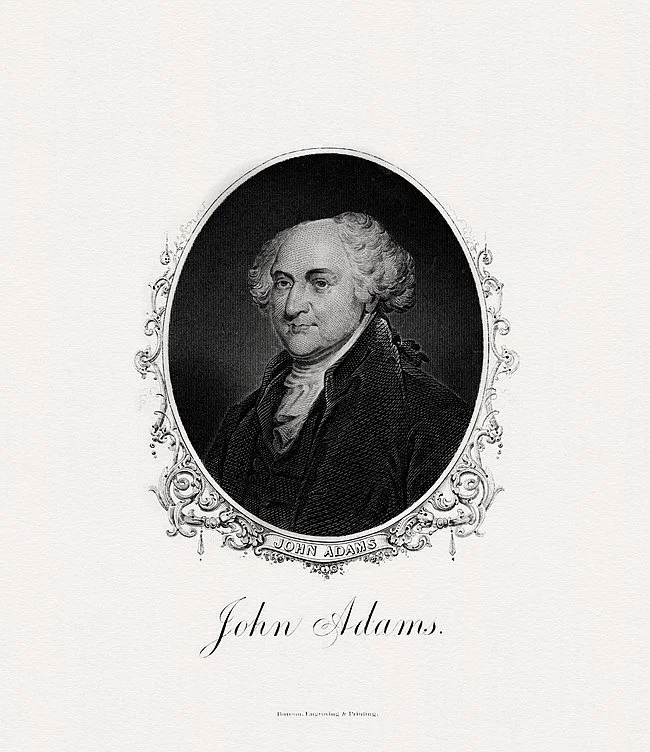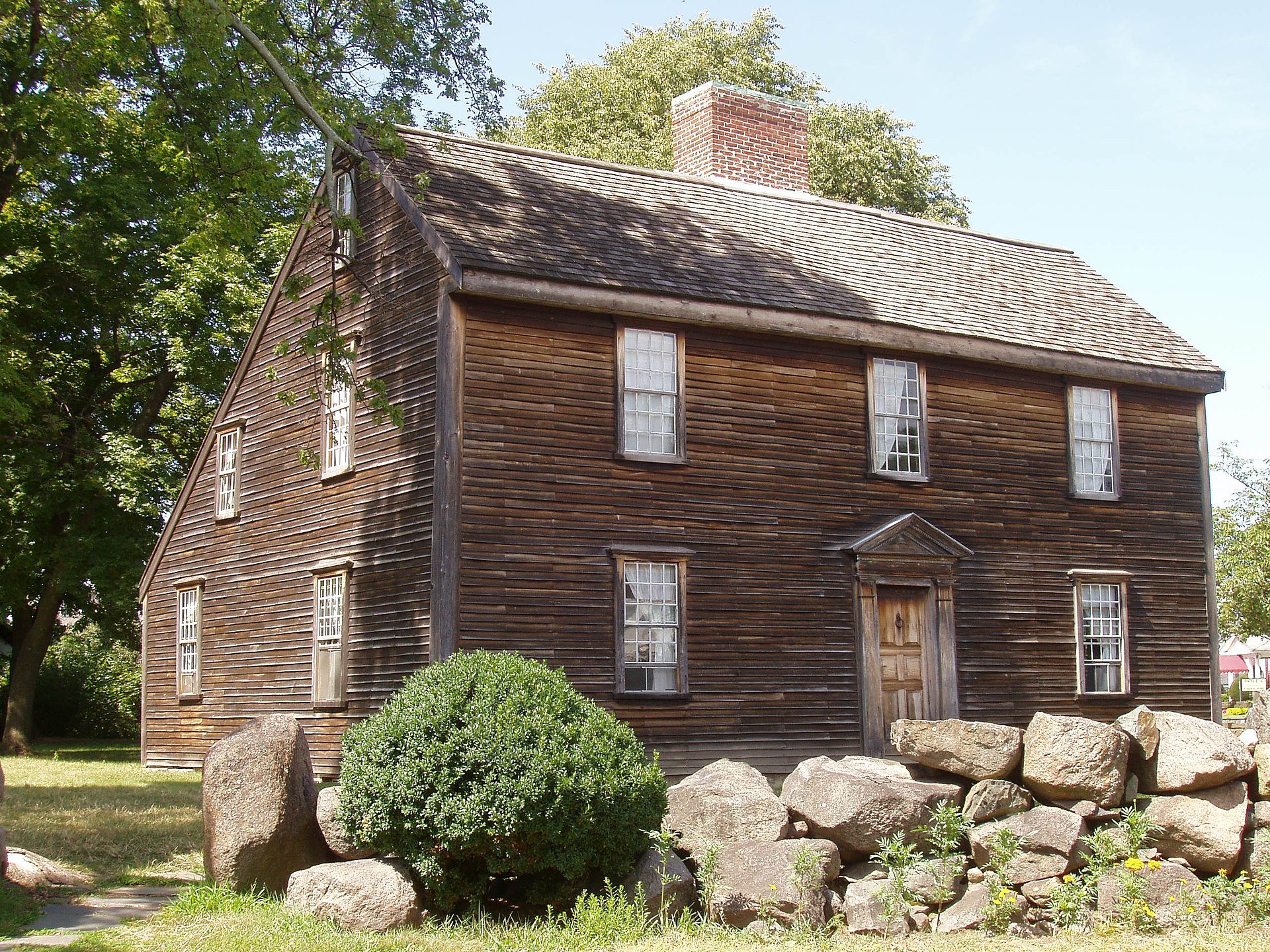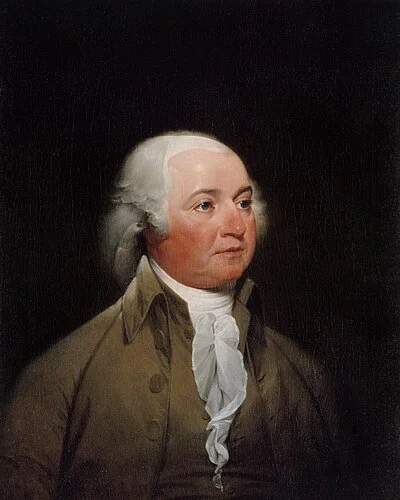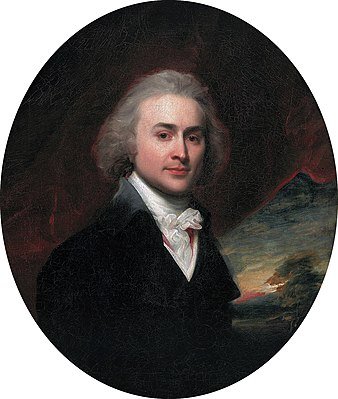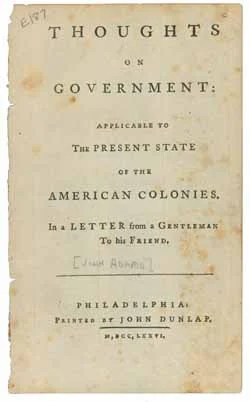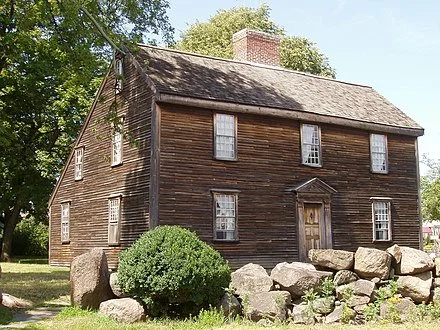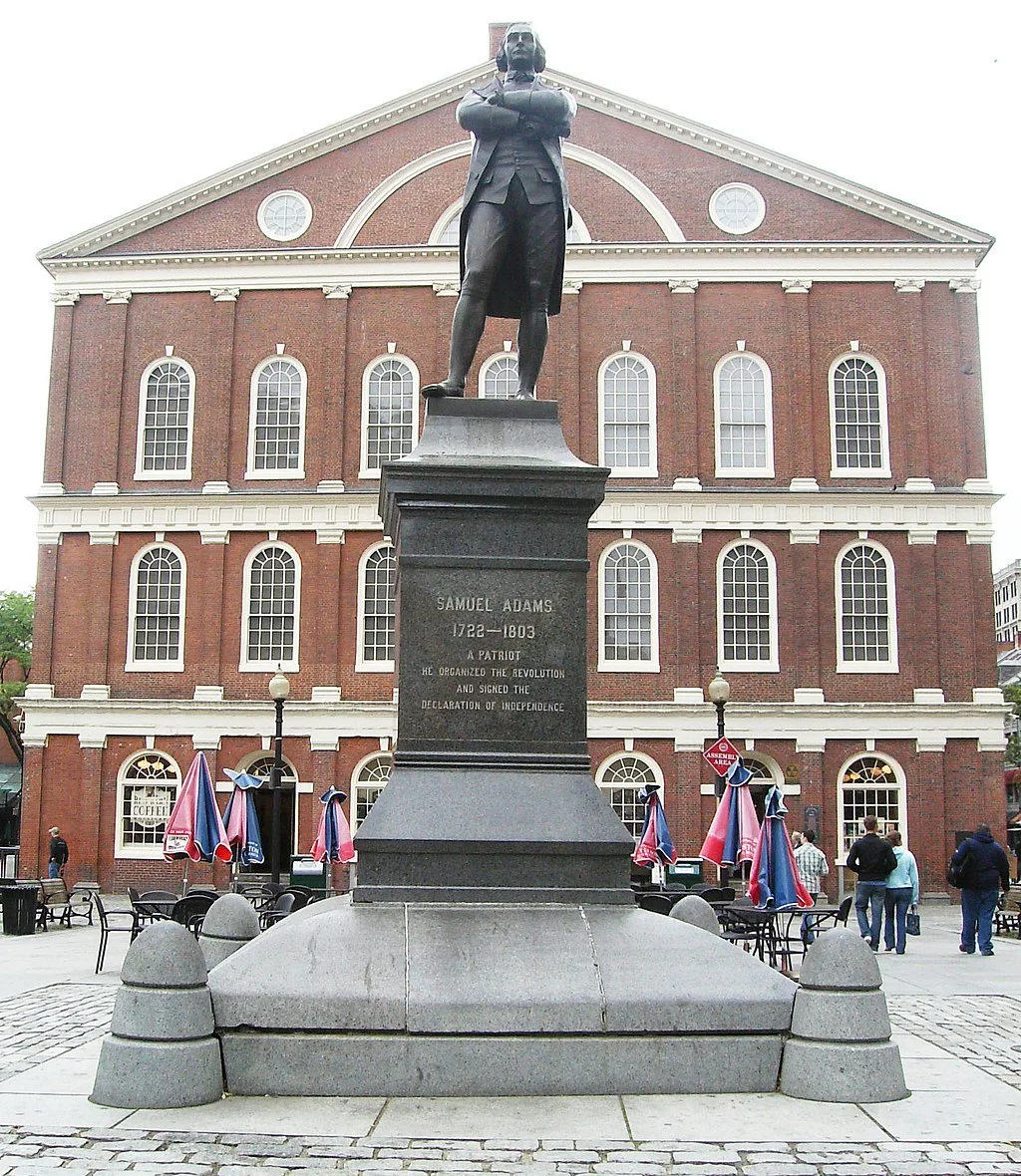
John Adams in a bad mood
An engraved portrait of John Adams as president by the Bureau of Engraving and Printing
Letter from John Adams, founding father and second president to John Taylor on Dec. 17, 1814
Dear Sir
In your fifth page You Say “Mr. Adams calls our Attention to hundreds of wise and virtuous Patricians, mangled and bleeding Victims of popular Fury.” and gravely counts up several Victims of democratic Rage as proofs that Democracy is more pernicious than Monarchy or Aristocracy.” Is this fair, sir? Do you deny any one of my Facts? I do not say that Democracy has been more pernicious, on the whole, and in the long run, than Monarchy or Aristocracy. Democracy has never been and never can be so durable as Aristocracy or Monarchy. But while it lasts it is more bloody than either. I beseech you, Sir to recollect, the time when my three Volumes of “Defence” were written and printed, in 1786, 1787 and 1788. The History of the University, had not then furnished me with a document I have Since Seen; an Alphabetical Dictionary of the Names and Qualities of Persons “mangled and bleeding Victims of democratic rage and popular fury” in France during the Despotism of Democracy in that Country, which Napoleon ought to be immortalised for calling “Ideology.” This Work is in two printed Volumes in octavo as large as Johnson’s Dictionary and is in the Library of our late virtuous and excellent Vice President Elbridge Gerry where I hope it will be preserved with anxious care. An Edition of it ought to be printed in America. otherwise it will be forever supressed, France will never dare to look at it. The Democrats themselves could not bear the Sight of it. They prohibited it and suppressed it as far as they could. It contains an immense number of as great and good Men as France every produced. We curse the Inquisition, and the Jesuits and yet the Inquisition and the Jesuits are restored. We curse religiously the Memory of Mary for burning good Men in Smithfield, when if England had the been democratical She would have burned many more, and We murder many more by the Guilotine, in the latter Years of the Eighteenth Century. We curse Guy Faulks for thinking of blowing Up Westminster Hall, Yet Ross blows up the Capitol, the Palace and the Library at Washington and would have done it With the same sang froid had Congress and the Presidents Family been within the Walls. Oh! my soul! I am weary of these dismal Contemplations! When will Mankind listen to reason, to nature or to Revelation?
You Say I “might have exhibited millions of Plebians, sacrificed to the pride Folly and Ambition of Monarchy and Aristocracy.” This is very true. And I might hav[, Start insertion,e, End,] exhibited as many millions of Plebians sacrificed by the Pride Folly and Ambition of their fellow Plebians and their own, in proportion to the extent and duration of their power. Remember Democracy never lasts long. It soon wastes exhausts and murders itself. There never was a Democracy Yet, that did not commit suicide. It is in vain to Say that Democracy is less vain, less proud, less selfish, less ambitious or less avaricious than Aristocracy or Monarchy. It is not true in Fact and no where appears in history. Those Passions are the same in all Men under all forms of Simple Government, and when unchecked, produce the same Effects of Fraud Violence and Cruelty. When clear Prospects are opened before Vanity, Pride, Avarice or Ambition, for their easy gratification, it is hard for the most considerate Phylosophers and the most conscientious Moralists to resist the temptation. Individuals have conquered themselves, Nations and large Bodies of Men, never.
When Solons Ballanc was destroyed, by Aristides, and the Preponderance given to the Multitude for which he was rewarded with the Title of Just when he ought to have been punished with the Ostracism; the Athenians grew more and more Warlike in proportion as the Commonwealth became more democratic. I need not enumerate to you, the foolish Wars into which the People forced their wisest Men and ablest Generals against their own Judgments, by which the State was finally ruined, and Phillip and Alexander, became their Masters.
In proportion as the Ballance, imperfect and unskillfull as it was originally here as in Athens, inclined more and more to the Dominatio Plebis; the Carthaginians became more and more restless, impatient enterprising, ambitious avaricious and rash; till Hanibal swore eternal <, Start deletion,Enmity, End,> Hostility to the Romans, and the Romans were compelled to pronounce Delenda est Carthago.
What can I Say of The Democracy of France? I dare not write what I think and what I know. Were Brissot, Condorcet, Danton Robespiere and Monsiegnieur Equality less ambitious than Cæsar, Alexander or Napoleon? Were Dumourier, Pichegru, Moreau, less Generals, less Conquerors, or in the End less fortunate than he was.? What was the Ambition of this Democracy.? Nothing less than to propagate itself, it is Principles its System through the World, to decapitate all the Kings, destroy all the Nobles and Priests in Europe? And who were the Instruments employed by the Mountebanks behind the Scene, to accomplish these Sublime purposes? The Fisherwomen, the Badauds, the Stage Players, the Atheists, the Deists, the Scribblers for any cause at three Livres a day, the Jews, and, Oh! that I could erace from my memory! the learned Divines profound students in the Prophecies. Real Philosophers, and Sincere Christians in amazing Numbers over all Europe and America were hurried away by the torrent of contagious Enthusiasm. Democracy is chargeable with all the blood that has been spilled for five and twenty years. Napoleon and all his Generals were but Creatures of Democracy as really as Rienzi Theodore, Mazzianello, Jack Cade or Wat Tyler. This democratical, Hurricane, Inundation, Earthquake, Pestilence call it which you will, at last arroused and alarmed all the World and produced a Combination unexampled, to prevent its further Progress.
John Adams birthplace in Quincy, Mass,
John Adams
Prepare for ruthless kleptocratic tyranny after Nov. 5; you can't hide
John Adams, in a 1793 painting by John Trumbull. Adams would have been mortified by Trump and his followers.
Birthplace of John Adams, in Quincy, Mass. This house is now part of the Adams National Historical Park, operated by the National Park Service, and open to the public.
— Photo by Daderot
"The fundamental article of my political creed is that despotism, or unlimited sovereignty, or absolute power is the same in a majority of a popular assembly, an aristocratical council, an oligarchical junto, and a single emperor. Equally arbitrary, cruel, bloody, and in every respect diabolical."
— John Adams (1735-1826), a Founding Father and second president of the United States, in a letter to Thomas Jefferson, dated Nov. 13, 1815. Both of them died on the 50th anniversary of the Declaration of Independence.
Don’t be a slob, become president
John Quincy Adams as a young man
“You come into life with advantages which will disgrace you if your success is mediocre. And if you do not rise to the head not only of your own profession, but of your country, it will be owing to your own laziness, slovenliness and obstinacy.“You come into life with advantages which will disgrace you if your success is mediocre. And if you do not rise to the head not only of your own profession, but of your country, it will be owing to your own laziness, slovenliness and obstinacy.’’
— Then Vice President (and the next President) John Adams (1735-1826) to his son John Quincy Adams (1767-1848), then a teenager, in 1794. John Quincy Adams managed to become secretary of state, president and congressman, in which job he led the opposition to slavery. Both Adamses are buried at the United First Parish Church, in Quincy, Mass.
‘Facts are stubborn things’
“I will enlarge no more on the evidence, but submit it to you, gentlemen—Facts are stubborn things; and whatever may be our wishes, our inclinations, or the dictates of our passions, they cannot alter the state of facts and evidence: nor is the law less stable than the fact. If an assault was made to endanger their lives, the law is clear, they had right to kill in their own defense.’’
— Founding Father John Adams (1735-1826) was asked to help provide a legal defense for the British soldiers involved in the Boston Massacre, the confrontation on March 5, 1770, in which a group of nine British soldiers killed five people in a crowd of 300-400 who were harassing them verbally and throwing various projectiles.
He bravely agreed to defend the soldiers do so despite public anger. Above is his most famous quote from the trial.
'Democracy never lasts long'
Document written by John Adams in 1776 and published anonymously.
John Adams, by Gilbert Stuart.
“I do not say that democracy has been more pernicious on the whole, and in the long run, than monarchy or aristocracy. Democracy has never been and never can be so durable as aristocracy or monarchy; but while it lasts, it is more bloody than either. … Remember, democracy never lasts long. It soon wastes, exhausts, and murders itself. There never was a democracy yet that did not commit suicide. It is in vain to say that democracy is less vain, less proud, less selfish, less ambitious, or less avaricious than aristocracy or monarchy. It is not true, in fact, and nowhere appears in history. Those passions are the same in all men, under all forms of simple government, and when unchecked, produce the same effects of fraud, violence, and cruelty. When clear prospects are opened before vanity, pride, avarice, or ambition, for their easy gratification, it is hard for the most considerate philosophers and the most conscientious moralists to resist the temptation. Individuals have conquered themselves. Nations and large bodies of men, never.”
— John Adams (1735-1826), American statesman, lawyer, diplomat, political philosopher, writer and a U.S. Founding Father who was the second president of the United States (1797-1801) and its first vice president (1789-1797). He was a loyal native of Massachusetts. His remarks were in a letter to a Virginian, John Taylor, in 1814.
John Adams’s birthplace, in Quincy, Mass.
‘Their last asylum’
Bronze and granite monument to Samuel Adams, put up in 1880 in front of Faneuil Hall, in downtown Boston. The hall was the home of the Boston Town Meeting, on Sept. 12 and 13, 1768, an extralegal assembly held in response to the news that British troops would soon be arriving to crack down on anti-British rioting.
— Photo by Anne Whitney
“Driven from every other corner of the earth, freedom of thought and the right of private judgment in matters of conscience direct their course to this happy country as their last asylum.”
— Samuel Adams, in “Speech in Philadelphia,’’ on Aug. 1, 1776.
Samuel Adams was an American statesman, political philosopher and one of the Founding Fathers of the United States. He was a politician in colonial Massachusetts, a leader of the movement that became the American Revolution, and one of the developers of the principles of American republicanism. And he served as the Commonwealth of Massachusetts’s fourth governor (1794-1797). He was a second cousin to his fellow (and less radical) Founding Father, John Adams, the second U.S. president.
All democracies commit suicide
Remember, democracy never lasts long. It soon wastes, exhausts, and murders itself. There never was a democracy yet that did not commit suicide.”
— John Adams (1735-1826), one of the most important American Founding Fathers and the second president
John Adams’s birthplace, at the Adams National Historical Park, in Quincy, Mass.
Massachusetts's three traditional 'social estates'
John Adams, in an 1815 painting by Gilbert Stuart.
[The Massachusetts constitution] was [John Adams’s] attempt to justify that structure by the traditional notion of social estates - that the executive represented the monarchical estate, the senate the aristocratic estate, and the house of representatives the estate of the people.
— Brown University historian Gordon S. Wood
